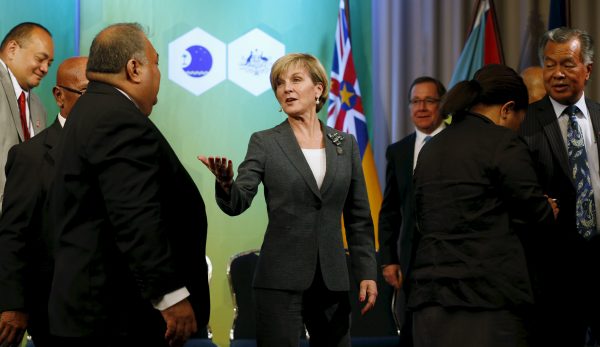Based on a simple comparison of size and material resources, it has been claimed that Australia has ‘a natural right to lead’ in the Pacific and is effectively a ‘great power’ or a ‘regional hegemon’.
But if this was once true, it is no longer the case. Even at the apparent high point of Australia’s influence, when it successfully secured the support of the Pacific Islands Forum to lead the Regional Assistance Mission to the Solomon Islands in 2003 and then persuaded Papua New Guinea (PNG) and Nauru to agree to smaller interventions in 2004, it has faced limits.
During the Solomon Islands intervention, Australia was constantly criticised by government officials and civil society. In PNG, Australia was forced to withdraw its police after a successful constitutional challenge to the immunity granted to them. And in Nauru, Australia’s governance assistance became increasingly contingent on Nauru’s agreement to host an asylum seeker processing centre.
The limits of Australia’s influence became clearer following the 2006 coup. Australia’s efforts to isolate and adopt sanctions against the military regime had little effect and, in 2012, Australia resumed formal diplomatic relations with the military regime two years before Fiji returned to democracy.
More recently, changes to the broader Asia-Pacific power structure have altered the geopolitical landscape. Most notably, China has increased its aid to the region and Russia recently made a significant donation of military equipment to Fiji. Indeed, the 2013 Defence White Paper acknowledges that ‘attitudes to our role are changing’ in the region, as ‘the growing reach and influence of Asian nations opens up a wider range of external players for our neighbours to partner with’. A number of these external partners were out in force at the dialogue following the recent Pacific Islands Forum leaders’ meeting, including China, India, Indonesia, Japan and South Korea.
Australian Prime Minister Turnbull has acknowledged that the complex regional context ‘demands more engagement at every level, more integrated policy and fresh ideas’. But while Australia’s announcement of an extra AU$80 million of funding to respond to climate change in the region was welcomed, this does not change the fact that Australia’s approach to climate change is fundamentally different to that of Pacific states.
The regional order is also evolving, with Pacific states increasingly creating, or strengthening, alternative regional and sub-regional institutions and organisations that exclude Australia. For instance, the Pacific Islands Development Forum — established by the Fijian military regime in 2012 — operates in parallel to (and potentially competition with) the Pacific Islands Forum. These alternative organisations also provide avenues for other external powers to acquire influence in the region.
PNG is an increasingly influential player in the region. But Australia’s relations with PNG are being undermined by its reliance on PNG hosting the Manus Island Regional Processing Centre. Towards the end of 2015 the PNG government cancelled the contracts of all Australian advisers working within the PNG government. And before the recent Pacific Islands Forum Trade Ministers meeting, PNG publicly announced that it would not participate in the Pacific Islands Agreeement on Closer Economic Relations (PACER Plus) on the grounds that it did not offer enough benefits.
Australia’s strategic influence in the Pacific is waning and the characterisation of the state as a ‘regional hegemon’ is a hollow one.
So Australia faces a dilemma. It has vital strategic interests in the Pacific but comparatively less influence with which to pursue them. Pacific states are largely unwilling to accept Australian leadership and are instead exercising ‘weapons of the weak’ — foot-dragging, expelling officials, staging demonstrations, sabotaging agreements, and brinkmanship.
It is thus time to reassess Australia’s Pacific strategy. Instead of characterising the Pacific as a threatening ‘arc of instability’, Australia’s foreign policy should start from a more positive premise that recognises the region’s potential. This may help Australia work with Pacific states as their principal security partner, rather than an increasingly marginalised hollow hegemon.
Joanne Wallis is a Senior Lecturer at the Strategic and Defence Studies Centre, Coral Bell School of Asia Pacific Affairs, The Australian National University and author of the forthcoming Hollow Hegemon: Australia’s Strategy in the Pacific Islands (Melbourne University Press, 2017).


There is much more of value to be said on this subject. Joanne Wallis’ coverage is thin, ‘newspaperish’ and not much more.
Australia is trapped in its incestuous relationship with the US in what is an entangling alliance called ANZUS. Australia has one standard of human rights for Pacific island states, for example, and another one for Saudi Arabia. Australia is tied to the apron strings of the US interventionist impulse–in becoming involved in America’s foreign wars–Vietnam, Afghanistan and more. Australia has blood on its hands — blood that does not easily wash off — like Kashoggi’s. Those of us who pay attention to the hidden aspects of Australia’s character know it both by what Australia spouts off about in public and by its silence. As a Pacific Islander I have a wide angled lens on Australia. What I see and what I have learned about Australia over many years (I earned a PhD in Australia and worked for its government in a sensitive position) impels me to tell Pacific island governments: “Watch out!! Among other things take note of information/intelligence asymmetry–Australia knows much more about us than we know about Australia.”